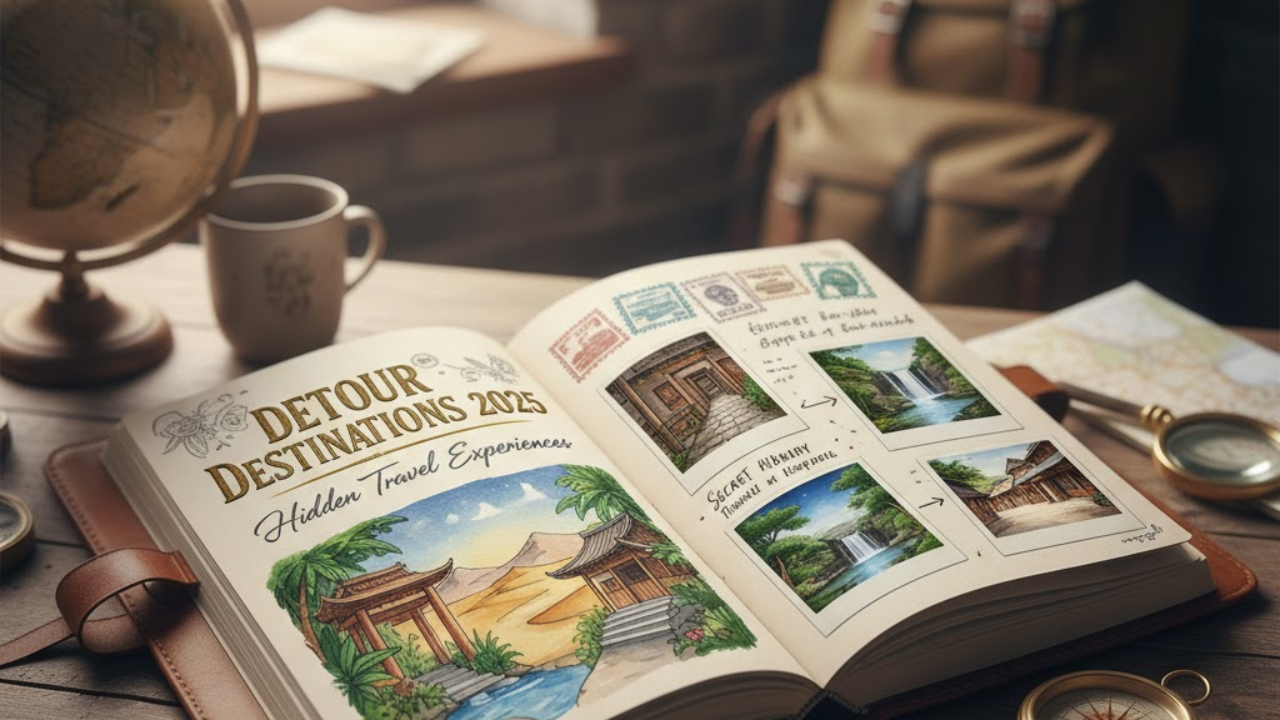You have not yet added any article to your bookmarks!

Join 10k+ people to get notified about new posts, news and tips.
Do not worry we don't spam!

Post by : Sameer Farouq
In 2025, a silent travel revolution is unfolding — and it’s happening away from the crowds. As global travel rebounds, seasoned explorers are rejecting overbooked tourist hubs and seeking something purer: detour destinations.
These are the overlooked villages, hidden beaches, and forgotten trails lying just beyond famous landmarks. Instead of standing in long lines at the Eiffel Tower, travelers are sipping wine in the vineyards of Burgundy. Instead of jostling through Bali’s beaches, they’re hiking the calm rice terraces of Sidemen.
The detour movement isn’t about isolation — it’s about intention. It’s about rediscovering the joy of exploration in a world that’s been overexposed.
A detour destination isn’t necessarily remote — it’s simply underrated. These places sit quietly near iconic attractions, offering a more personal and meaningful experience.
What makes them magical is balance: proximity to convenience yet distance from chaos. They hold the essence of their culture, untouched by mass tourism. The food is local, the people are genuine, and the experiences are spontaneous.
Every detour destination feels like a secret — one that only the curious find.
Humans are wired for discovery. After years of following algorithms and influencer guides, travelers are craving serendipity again — the thrill of finding something unexpected.
Detour travel taps into that instinct. It offers a sense of accomplishment and emotional reward that’s missing from pre-packaged itineraries. It’s no longer about ticking boxes; it’s about creating stories you can’t Google.
This movement is powered by the belief that travel should surprise you, not just serve you.
Instead of Santorini (Greece): Try Milos, with its unspoiled beaches and volcanic landscapes.
Instead of Venice (Italy): Explore Burano or Chioggia, where local fishermen still dominate the canals.
Instead of Bali (Indonesia): Head to Sidemen Valley or Amed, where rice fields meet tranquil coastlines.
Instead of Paris (France): Visit Colmar or Annecy, picturesque towns that capture fairytale charm without the rush.
Instead of Manali (India): Go to Tirthan Valley, a serene Himalayan retreat with clear rivers and pine trails.
Each detour offers what mass tourism can’t — quiet authenticity.
What truly defines detour destinations is the depth of local connection they provide. Travelers who venture off the main path often end up forming real relationships — with artisans, guides, and families who welcome them into their world.
You might learn pottery from a craftsman in a small Greek village, share homemade tea in a Japanese countryside inn, or join a local festival in a Rajasthani hamlet. These encounters reveal the soul of travel — where humanity feels close and unfiltered.
Such experiences can’t be planned; they’re earned through curiosity.
Detour tourism isn’t just good for travelers — it’s vital for the planet. By redistributing visitor flow, it helps prevent overcrowding and protects fragile ecosystems from strain.
Local economies benefit too. Lesser-known areas receive direct income without being commercialized. Travelers support small guesthouses, family-run restaurants, and local crafts rather than global chains.
This gentle form of tourism reflects a growing trend — travel that restores, not depletes.
Detour destinations invite travelers to slow down. Without rigid schedules or crowds, every walk, meal, or conversation becomes an experience in itself.
Instead of racing through ten landmarks, you spend hours watching village life unfold, or capture golden light over untouched hillsides. In these quiet corners, you find what travel used to feel like — personal, poetic, and profoundly peaceful.
The journey becomes less about where you go and more about how deeply you see.
Planning detour travel requires curiosity and openness. Instead of searching for “top 10 attractions,” modern travelers use tools that highlight local stories, lesser-known routes, and ethical experiences. AI trip planners, digital maps, and local blogs now help travelers discover hidden spots near tourist hubs.
Some boutique travel companies even specialize in detour curation, offering itineraries that blend famous landmarks with secret escapes nearby. This hybrid approach satisfies both comfort and curiosity — ideal for modern explorers who crave balance.
Disclaimer: This article is for informational purposes only. Travelers should research accessibility, safety, and cultural etiquette before visiting lesser-known regions. Respect local traditions and avoid sharing sensitive locations to preserve their authenticity.










Sri Lanka Ex-Intel Chief Arrested Over Easter Attacks
Former SIS Chief Suresh Sallay arrested by CID in connection with the 2019 Easter Sunday bombings th

Japan Reports Spike in Measles Cases Authorities Issue Alert
Japan confirms 43 measles cases in early 2026, prompting health authorities to warn potential contac

Korea US Clash Over West Sea Drill Communication
Conflicting accounts emerge on prior notice briefing, and apology during Feb 18-19 US air exercise i

Richard Liu launches $690M eco-yacht brand Sea Expandary
JD.com founder Richard Liu invests $690M in Sea Expandary aiming to produce affordable green yachts

China imposes export curbs on 40 Japanese firms over military ties
Beijing restricts dual-use exports to Japanese companies, citing remilitarization concerns, promptin

Malaysia moves to protect Musang King durian amid China impostors
Authorities safeguard Malaysia’s Musang King brand as durians from Thailand and Vietnam are being fa